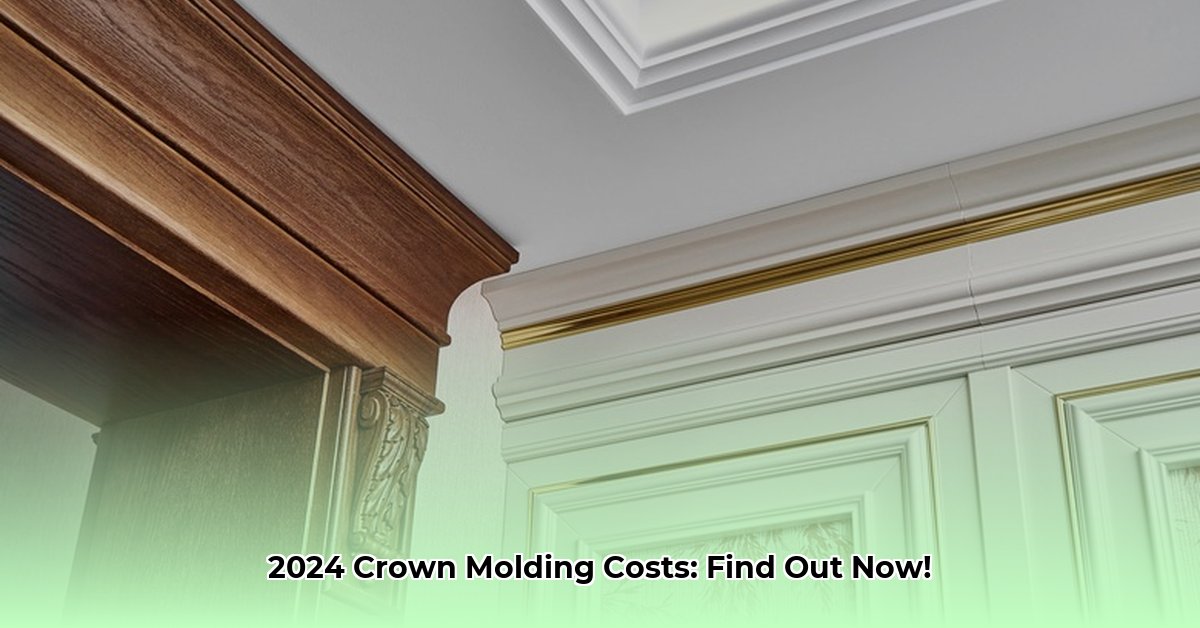Ever wish your rooms had a little more oomph? Crown molding is like adding architectural jewelry – it instantly elevates any space. But let’s be real, the first thing on everyone’s mind is the price tag. This guide breaks down crown molding costs, covering everything from materials and labor to DIY vs. hiring a pro. Whether you’re a seasoned DIYer or plan to call in the pros, we’ll equip you with the knowledge to estimate your project cost and make smart choices.
Crown Molding Costs: Your Budget Guide
Adding crown molding is a fantastic upgrade, but before you grab your hammer, let’s talk budget. How much does it cost to install crown molding? Several factors influence the final price, so let’s unpack them.
Factors Affecting Cost: It’s All in the Details
Just like building a custom pizza, each element adds to the final cost of your crown molding project.
Material Matters: From Basic to Luxurious
Your chosen material significantly impacts the overall expense. Here’s a general idea of material costs per linear foot:
| Material | Estimated Cost per Linear Foot | Pros | Cons |
|---|---|---|---|
| Foam | $1 – $4 | Lightweight, easy to install | Less durable |
| MDF | $1 – $3 | Affordable, takes paint well | Not moisture-resistant |
| PVC/Vinyl | $3 – $7 | Moisture-resistant, durable | Can look less authentic |
| Pine | $2 – $5 | Classic look, affordable | Can warp or shrink over time |
| Oak/Maple | $5 – $12 | Durable, beautiful grain | More expensive than pine |
| Primed Pine/MDF | $3 – $8 | Saves painting time | Color selection limited |
| Flexible Molding | $5 – $15 | Ideal for curves, unique design | Can be harder to install |
| Exotic Wood | $10 – $45+ | Luxurious, high-end look | Significantly more expensive |
| Plaster | Varies | Ornate designs | Expensive, tricky installation |
| Metal | $20 – $25+ | Sleek, modern appearance | More expensive, less common |
| Reclaimed Wood | Varies | Eco-friendly, rustic character | Dependent on wood species available, quality varies widely |
Remember, these are estimates. Check with your local suppliers for the most up-to-date pricing in your area.
Pro Tip: Consider eco-friendly choices like reclaimed wood. It adds character while being kind to the planet. Some reclaimed wood might cost more upfront but suggests it can be a durable, long lasting, and environmentally friendly choice.
Labor Costs: The Price of Expertise
Unless you’re a seasoned DIYer, you’ll probably hire a professional. Labor costs typically range from $7 to $16 per linear foot, depending on complexity and location. Intricate designs, high ceilings, and existing trim removal all add to labor time and cost.
Room Size: More Space, More Molding
The larger the room, the more molding you’ll need, increasing both material and labor costs. A small bathroom might cost $200-$400, while a large living room could be $1,000-$2,000 or more.
Other Cost Considerations
- Existing Trim Removal: Existing trim needs to be removed before installing new crown molding.
- Painting/Finishing: Factor in the cost of paint or stain if you’re not using pre-finished molding.
- Geographic Location: Labor costs tend to be higher in metropolitan areas than in smaller towns.
Calculating Your Crown Molding Installation Cost: A Step-by-Step Guide
- Measure: Measure the perimeter of the room(s) in feet. This is your linear footage.
- Material Cost: Multiply the linear footage by the per-foot cost of your chosen material.
- Labor Cost: Multiply the linear footage by the average labor cost in your area ($7-$16/linear foot).
- Additional Costs: Add 10-15% for extras like paint, trim removal, caulk, nails, and other unforeseen issues.
- Total Cost: Add all costs together for your final estimated budget.
DIY vs. Hiring a Pro: Weighing Your Options
DIY:
- Pros: Potential cost savings, personal satisfaction.
- Cons: Time-consuming, requires specialized tools and skills, mistakes can be expensive.
Hiring a Pro:
- Pros: Professional results, saves time and effort, reduced risk of errors.
- Cons: Higher upfront cost, requires finding a reputable contractor.
Tips for Saving Money: Smart Choices for a Stylish Upgrade
- Buy in Bulk: If possible, buy materials in larger quantities to get a lower per-unit price.
- Keep it Simple: Simpler molding profiles are often less expensive.
- DIY Prep: Handle some prep work yourself, like removing old trim or patching walls.
- Shop Around: Compare prices from multiple suppliers. Material costs vary so shopping around can identify the best deals.
- Consider Off-Season Installation: Contractors may offer lower rates during their slower seasons.
- Negotiate: Don’t be afraid to negotiate with contractors, especially for larger projects.
- Explore Alternatives: Consider using paintable caulk to fill small gaps after installation which could reduce the necessity for higher finishing and labor costs.
Finding Local Contractors: Due Diligence Pays Off
Get at least three quotes from different contractors. Check online reviews, ask for references, and verify licenses and insurance.
FAQ: Your Crown Molding Questions Answered
- What is the most affordable crown molding material? Foam, MDF, and PVC are generally the most budget-friendly options.
- Can I install crown molding myself? Yes, but it requires precise measurements, specialized tools, and patience. If you’re not comfortable with DIY projects, it’s best to hire a professional.
- How do I measure for crown molding? Measure the perimeter of the room in feet. This gives you the linear footage needed.
- How do I find a reputable contractor? Get multiple quotes, check online reviews, ask for references, and verify licensing and insurance.
Conclusion: Ready to Crown Your Space?
Adding crown molding elevates your home’s style and value. By understanding the factors influencing cost and following our guide, you can plan your project with confidence and achieve the look you desire without overspending.
- Does Ammonia Kill Mold? The Truth About Using It for Removal - April 15, 2025
- Does Bleach Kill Spiders? Effectiveness, Safety, and Better Alternatives - April 15, 2025
- Does Soap Expire? How to Tell if Your Soap Has Gone Bad - April 15, 2025










